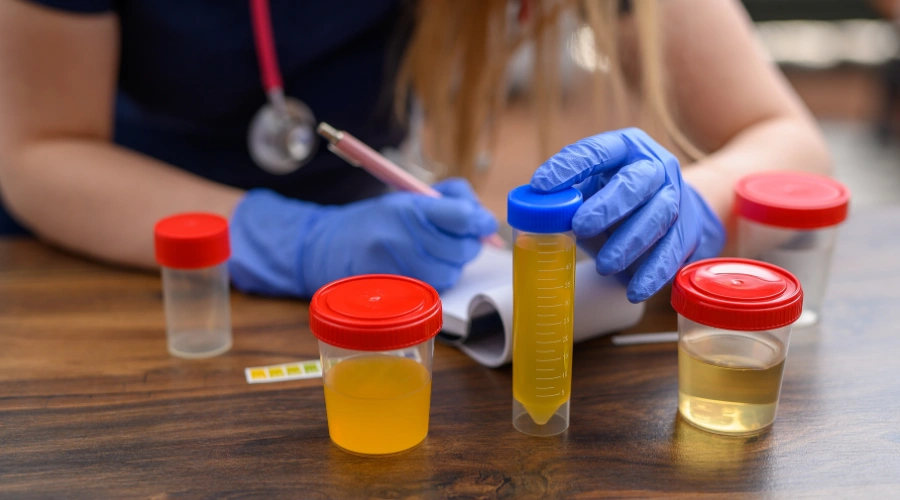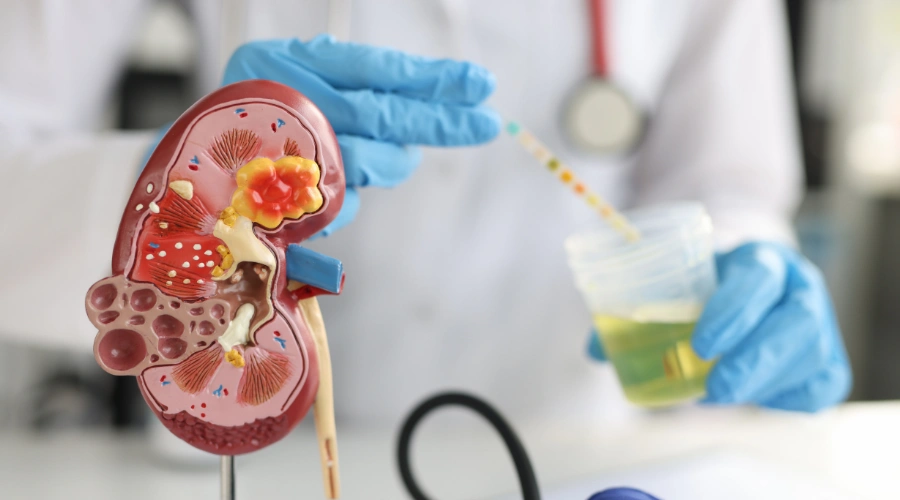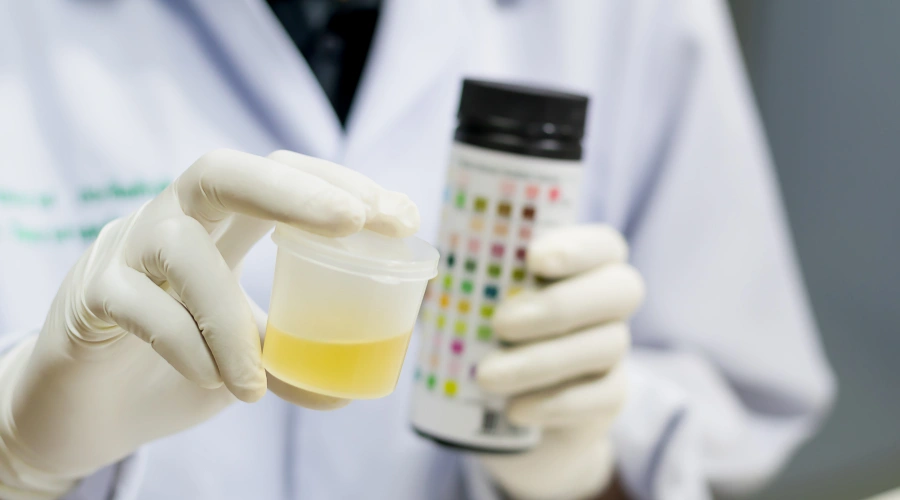Get Answers on Drinking Alcohol Before a Drug Test for Your Job
As an employee for any length of time, you get to know the routine around testing for alcohol and substances. You know that employers may conduct drug tests on employees to fulfill legal obligations, address employee health concerns, or maintain a safe work environment.
But alcohol is a legal substance, and there are still some instances where it will show up in drug test results. So, does alcohol show up on a drug test for work?
We understand that people searching for whether alcohol will show up on a drug test for work are often scared of serious repercussions. For example, getting into trouble at work or losing your job.
South Shores Recovery can help and will give you the direct answers in the next paragraph. We would also like to remind readers that seeking treatment for problem drinking can change your life by ensuring that you will no longer have to worry about the presence of alcohol (or other substances) in a drug test.
Will a Drug Test for Work Detect Alcohol Consumption?
The most accurate answer here is: sometimes. Though not all drug tests look for alcohol, many employers will order a test that detects alcohol.
For example, even though a standard 5-panel drug test does not look for alcohol, many other types of drug tests do.
A test that detects alcohol could be part of a pre-employment screening or standard practice. They might also be used when a person re-enters the workplace after addiction treatment, following a workplace accident, or when it is suspected that an individual has been under the influence at work.
The Main Types of Drug Tests and Alcohol Detection Windows

Here are the types of drug tests employers will most often use to detect recent alcohol consumption:
Urine Alcohol Tests
Urine tests are some of the most common types of drug tests used by employers. Alcohol may show up in your urine sample for somewhere from 2-5 days, depending on the screening cutoff and how heavy your alcohol use is. This estimate is for advanced urine tests looking for EtG (ethyl glucuronide).
Standard urine drug testing looking for ethanol, on the other hand, will only show alcohol for about 12 hours. So, the detection window does depend on what type of urine test your employer orders.
Blood Drug Tests
Blood tests can detect alcohol for up to around 12 hours. This test measures your blood-alcohol level and is conducted in the same manner as any other blood draw. It’ll take a few minutes, and your employer should get the drug test results within a few days.
Hair Follicle Tests
In hair tests, alcohol can remain detectable for months. It is more difficult to tamper with the results of a hair drug test compared to a standard urine test. The longer detection window can be beneficial in some cases.
When you get a hair drug test, the collector will cut strands of your hair (usually, from the scalp). They will not cut the strands from a single spot. This type of test is not used as often in the workplace.
Get to Know the Factors Affecting Alcohol Screening Results

It’s not just the type of drug test that will affect your alcohol detection window. Factors such as the following also have an impact on how long substances like alcohol may show up in your drug test.
- Liver function. If you have impaired liver function, alcohol may be present in a drug test for significantly longer. This is a possible consequence of alcohol abuse.
- Alcohol consumption level and frequency. Those who drink regularly and heavily are more likely to get a positive drug test for a longer period of time. If someone has one drink every couple of months vs. a few drinks per day, it’ll leave their system faster.
- Hydration level. If you are well-hydrated, alcohol may leave the body more quickly than it would in someone who is dehydrated.
Other factors, such as body weight, genetic variations, and age, can make a difference too. The best way to make sure that you get a negative test is to stop drinking.
What are the Effects of Alcohol Abuse in the Workplace
Why do employers test for drugs and alcohol? Heavy drinking can affect your work severely, alongside other parts of life, like your interpersonal relationships and physical health.
Effects of alcohol abuse in the workplace can include, but are certainly not limited to:
- Reduced performance at work.
- Increased workplace absences.
- A higher chance of workplace accidents.
Treatment for alcohol use is a worthwhile investment for employers and individuals.
Getting Help for a Drinking Problem

South Shores Recovery treats most types of substance use disorders, including alcohol addiction. Here’s how our programs can help.
Medical Detox for Alcohol Withdrawal
When you first stop drinking, your body goes through an adjustment period. Alcohol withdrawal can be dangerous without appropriate medical monitoring and treatment from healthcare providers.
The more you drink, the more likely you are to have serious alcohol withdrawal symptoms.
Our medical alcohol detox program helps people get off alcohol and other drugs safely. Medications and other treatments, like hydration support, may be used at this time. Although alcohol withdrawal can cause uncomfortable symptoms, the acute withdrawal stage is relatively short-lived.
Residential Inpatient Treatment Program
Our residential inpatient treatment program provides a structured environment and daily therapy services. After breakfast, you’ll participate in group therapy and other treatments, which may vary depending on the day. For example, individual therapy, family therapy, and other activities, like recreation and supervised outings.
Clients at this care level reside on-site at our Southern California facility. You can expect to stay for about 30-60 days at most residential treatment facilities (although this can differ). South Shores Recovery’s facilities are pristine and tranquil. View our program gallery to see photos.
We have everything you need to heal your body, mind, and soul during the recovery process. Nutritious meals, high-end amenities, and specialized services make a difference in the care we provide.
Outpatient Alcohol Treatment Programs
Outpatient alcohol treatment programs are ideal for those stepping down from a lower level of care, like inpatient rehab. They can also be used as an alternative to inpatient alcohol rehab. Our outpatient treatment options include:
- Partial Hospitalization Program (PHP).
- Intensive Outpatient Program (IOP).
Clients who need to work while getting treatment for addiction may prefer our IOP. The hours are significantly lower than those of our PHP, which means you will be able to balance work with treatment. PHP is more intensive, meeting for most of the day throughout the week.
Dual Diagnosis Treatment
Dual-diagnosis treatment is available at every care level offered by South Shores. Also called integrated treatment, dual-diagnosis treatment addresses addiction and co-occurring disorders comprehensively.
This facilitates positive outcomes, such as an increased chance of recovering from or successfully managing both conditions.
Choose South Shores to Get Help for a Drinking Problem

South Shores Recovery takes a personalized, caring, and compassionate approach to alcohol addiction treatment. The experts at our leading Orange County recovery center are here to help you take your life back, protect your employment, and, most importantly, your health.
Call our admissions line to learn more about our alcohol treatment programs in California today. Our team is available to answer your questions or initiate the intake process.
All calls are completely confidential, so please reach out now to get answers and effective support!
FAQs About Alcohol and Drug Testing Procedures in the Workplace
What can cause a false positive alcohol test?
It is possible to get a false positive when you get a drug test. False positive results for alcohol can be caused by anything containing EtG, like mouthwash that contains alcohol. Certain medications can also cause a false positive.
What are EtG tests?
EtG tests detect alcohol metabolites in the body, as opposed to blood-alcohol concentration. Both EtG and EtS (ethyl sulfate) tests are considered accurate and reliable for identifying the presence of alcohol metabolites.
What happens if I get a positive alcohol test result at work?
If an employer is concerned about your drinking, a positive alcohol test may result in:
An intervention. Your employer may meet with you in private to address concerns about alcohol or drug use.
A referral to alcohol addiction treatment. You may take a leave from work to get help for addiction.
Follow-up drug testing (e.g., randomized drug tests). Specifically, when you return from treatment, or to address a false positive.
However, the answer to this question ultimately depends on your employer and the reason for the drug test.
What are the other types of drug tests used for alcohol testing at work?
In addition to hair, blood, and urine tests, several other types of drug tests can be used in various contexts. Breath tests (also known as breathalyzers) and saliva tests can also detect the presence of alcohol and other drugs.
Will one shot of alcohol show up on a drug test?
Yes. If you get a drug test meant to identify alcohol within the standard detection window following a shot of alcohol, it will most likely show up on the test. EtG and EtS tests will often detect alcohol for a longer period than some other types of drug tests.
Can I fail a drug test due to alcohol?
If a drug test is looking for alcohol, yes. Drinking alcohol should produce positive drug test results as long as it’s consumed within the testing window. Some tests do not look for alcohol. If a test is not meant to identify alcohol, and you do not consume any other illicit substances, nothing should be flagged.


Recent Comments